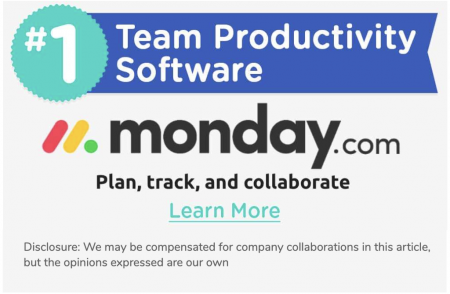What does an Office Manager (OM) really do? Manage the office? That could mean anything! OM job descriptions often feature open-ended language, most likely to capture the dynamic nature of the role. For example, a sample job description from Monster includes this responsibility:
“Contributes to team effort by accomplishing related results as needed.”
Anyone reading that bullet point will probably wonder exactly what kind of “related results” might be required of them. To create a comprehensive—and descriptive—Office Manager responsibilities list, we went straight to the experts: practicing OMs. Our list includes all the standard OM duties…and the ones no one else will tell you about – like using monday.com.
Many of these responsibilities came straight from our Facebook group of Office Managers! See what nuggets of wisdom our community has to offer and jump into the conversation. Join the group here.
Free Bonus: Get a PDF version of The 2018 State of The Office Manager Report. We surveyed 572 Office Managers to uncover 10 takeaways you can use to hit your goals and overcome challenges. Plus learn what other Office Managers are getting paid (and how you can earn more)!
Little-Known Office Manager Responsibilities
Every job comes along with a few surprise responsibilities that didn’t come up in the job description or during the interview process. Here are some little-known responsibilities many OMs encounter on the job.
Be the unofficial “groundskeeper”
- What the job description says: Keep the office organized
- What it really means: OMs end up doing everything and anything that needs to be done to keep the office from sinking into a state of utter chaos. Many OMs clean up conference rooms after meetings, which includes picking up plates, handling leftovers, and pushing in chairs. OMs also clean up office kitchens, load dishwashers, pick up stray dishes and rubbish around the office, and organize storage spaces. Some brave OMs even take on bathroom duties, from stocking toilet paper and paper towels to unclogging toilets.
Additionally, OMs usually take the lead on office design and decorating, organizing office moves, ordering (and sometimes assembling) furniture, and more.
- Example scenario: Someone let leftovers rot in the refrigerator. An employee calls to alert the OM about the unbearable smell. The OM thinks maybe the person responsible will take care of it. After receiving five more employee complaints, the OM steps up to save the day.
- How to build skills and excel in this responsibility: Just be prepared for anything. Record all the things you clean up or repair around the office and share with management to make a case for paying for a cleaning service…or even a plumber. Share the list, even if your company already pays for a cleaning service; you should not have to pick up the extra slack!
Listen, encourage, and occasionally provide workplace “therapy”
- What the job description says: Support employees with day-to-day needs
- What it really means: OMs work closely with pretty much everyone in the office. As a result, they build deep relationships and become figures of trust and comfort. In fact, many OMs say they provide free therapy, especially in offices (most offices) that don’t have an on-site therapist. OMs listen to problems and provide guidance, assistance, and words of encouragement.
- Example scenario: A vague email just circulated, telling employees to expect a few key changes to office vacation policies. The OM listens and responds calmly to the nervous buzzing of every employee who cruises by her desk looking for answers.
- How to build skills and excel in this responsibility: The unofficial job of “office therapist” requires patience and high levels of emotional intelligence. Here are some quick tips:
- Listen carefully and give coworkers your full attention. Focus on what they’re saying and evaluate what they might be feeling.
- Ask questions and do your best to fully understand the issue before offering your response.
Solve all the problems, especially IT problems
- What the job description says: Monitor internal processes
- What it really means: OMs work with all employees and departments. They build unparalleled knowledge of a company’s inner workings. As a result, employees often count on them to have all the answers, solve all the problems, and do essentially everything else that comes up. Many OMs solve a variety of IT problems, including unclogging printer jams, resolving minor computer issues, and more. If an OM has no idea how to attend to these problems, she’ll likely do research and figure it out.
- Example scenario: The printer keeps beeping. No one has any clue what’s going on; even the 20-year company veteran says he’s never heard any office printer make that noise before. The OM scours the internet and eventually calls the printer manufacturer to find answers.
- How to build skills and excel in this responsibility: Cultivate sharp problem-solving skills. Try applying the IDEAL framework to any problem:
- Identify the problem
- Define the context
- Explore and evaluate solutions
- Act
- Look back to see what worked
Plan parties and meetings
- What the job description says: Assist with event planning
- What it really means: Plan all events from start to finish.
- Example scenario: During her second week of work, an OM attends a weekly all-hands status meeting. Someone asks her how plans for the annual meeting are coming along. She wonders what annual meeting they’re talking about, but she knows she needs to figure it out by next week.
- How to build skills and excel in this responsibility: Brush up on event-planning skills with checklists, ideas, and templates you can use to plan any event, including corporate events, company retreats, and office parties.
Smile all the time
- What the job description says: Nurture office morale
- What it really means: OM roles attract positive, energetic, and optimistic people. They’re always willing to help in any way they can, while also keeping an upbeat attitude. Employees observe, and start expecting, this perpetually positive attitude. An OM having a bad day must still put on a brave face.
Trusted to put the best face forward at all times, OMs often become the company’s “public image.” Employees ask them to meet and greet clients, vendors, and other office visitors…including dogs.
- Example scenario: An OM told her boss she would finish his meeting presentation at the last minute. The meeting starts in just one hour. An employee rushes over to tell the OM that the conference room reserved for the meeting is a mess. Even if she has no idea how she’s going to take care of it, the OM must smile and say, “I’ll take care of it.”
- How to build skills and excel in this responsibility: Psychology experts say that a sense of purpose helps people maintain a positive attitude. When you grow tired of people expecting you to do it all with a smile, remember how much you really, truly help people on a day-to-day basis.
Standard Office Manager Responsibilities
These responsibilities appear across most OM roles. Job descriptions typically list these standard duties up front.
Managing calendars
OMs often share calendar management duties with the company’s administrative team. Some job descriptions will mention specific types of calendars the OM should expect to manage. Managing calendars for office conference rooms and meetings often falls into the OM’s jurisdiction, and sometimes, they take on travel and individual calendars as well.
How to build skills and excel in this responsibility: Take advantage of all the calendar management tricks and tools available.
Handling payroll
OMs often take charge of payroll duties, especially at small- to mid-sized companies that don’t have full Human Resources departments.
How to build skills and excel in this responsibility: Make sure you understand what’s expected of you and spend time learning all the systems and processes the company already uses. Keep an eye out for process improvements!
Keeping the office stocked with supplies and sometimes food
In our 2018 State of the Office Manager report, 95% of respondents said they regularly stock supplies, and 55% said they order and manage free company snacks.
How to build skills and excel in this responsibility: Come up with an inventory tracking and management system that works for you.
- Decide how often you want/need to place orders.
- Calculate the quantity of your first order. Ask employees about their favorite supplies and snacks. Check in on the supply closet/kitchen to see which items go quickly.
- Plan to make daily or weekly counts of the supplies or snacks depending on your schedule.
Most importantly, find a tracking and organization tool that works for you. Airtable, a free online hybrid of spreadsheet and database, even has an office inventory management template you can start using today.
Creating reports and presentations
OMs make a lot of reports and presentations. They might be presenting on key qualitative findings from a recent employee morale survey one week and then switching gears to make a zero-fluff quantitative report of payroll numbers the next week.
How to build skills and excel in this responsibility: Since OMs create such a wide range of reports, knowing the most effective ways to present information—any information—will get OMs ready to create quality deliverables on any topic. Structures and layouts will depend on the type of information at hand, but one universal practice will always produce the right mindset for creating vivid reports and presentations: Consider your target audience.
Manning the office phone and email account
OMs represent their companies in multiple ways. They’re often the first people in-person visitors see when they enter the office, and they’re often the “voice” behind company phone calls and emails. Many OMs serve as sole owners of critical office communication accounts.
How to build skills and excel in this responsibility: Boost your communications skills by running everything you say and write through the 5 C’s of effective communication. There are many variations on the 5 C’s, but here’s our take for office managers:
- Clear: Ask someone to read your email before you send it, or carefully consider the meaning of the request you plan to deliver when you get someone on the phone. Taking a short pause is often all we need to realize we’re not being as clear as we originally thought.
- Complete: Have you left out any critical pieces of information? (For example, if you’re planning to ask a potential event venue about their capacity, you should probably also tell them the date of your event so they can respond on both capacity and availability.)
- Concise: Strip communications down to the basics to make everything easy to understand. For every key point you make, ask yourself: Does my target really need to know this?
- Correct: Double check everything to avoid losing credibility.
- Compassionate: Consider the range of feelings your communication might trigger. Have you said anything that could be misinterpreted? Can you soften any follow-ups to a delinquent vendor?
Onboarding and offboarding employees
This is another OM responsibility incredibly common at small- to mid-sized offices without Human Resources departments, and it’s probably the reason employees see OMs as trusted resources who have all the answers. This high-level responsibility could be one of the most important jobs in the entire company; the onboarding (and offboarding) process determines a new or existing employee’s entire perspective of the company. At some companies, meeting with the OM is the only orientation process employees go through.
How to build skills and excel in this responsibility: This responsibility, like so many other things in life, follows the classic “practice makes perfect” rule. The more onboardings and offboardings OMs complete, the better they’ll become at the entire process. OMs looking to improve their orientation skills can talk to employees before, during, and after the process. Find out what they like, what they expect, and what they think could be improved and carefully tend to those areas.
As you gather intel specific to your company processes, follow universal best practices. Engagement Trends recommends these three tips for nailing the onboarding process:
- Find ways to make the onboarding process fun to increase engagement. Offer snacks, plan icebreakers, and have a list of jokes at the ready.
- Don’t be afraid to use technology to distribute forms, presentations, and relevant onboarding reading materials. This allows employees to cover all the technical aspects of onboarding in their own time, so the onboarding meetings can get more personal.
- Put employees at ease by transparently explaining company rules, goals, and expectations. If you know goals specific to the new employee’s role, then share those as well.
Do you know of any other unexpected responsibilities Office Managers take on? Let us know in the comments below!
P.S. Many of these responsibilities came straight from our Facebook group of Office Managers! See what nuggets of wisdom our community has to offer and jump into the conversation. Join the group here.
Free Bonus: Get a PDF version of The 2018 State of The Office Manager Report. We surveyed 572 Office Managers to uncover 10 takeaways you can use to hit your goals and overcome challenges. Plus learn what other Office Managers are getting paid (and how you can earn more)!

















Surely! You won’t find these responsibilities in a manager’s description. Such a valuable information.
Most of these job responsibilities fall under the Executive Assistant or HR. Our OM is rarely in the office. She usually shows up at 11 and leaves by 2 and if the weather is bad she is “working from home”. Honestly don’t even know why they keep her on. She has none of these responsibilities.
I am new at an office. The office expects the OM to keep the printer stocked with paper. I understand keeping the office stocked with paper, but does that include making sure the printer never runs out of paper?
I am pretty easy going and just fill it of empty for the OM. While I know a lot of frustration from my boss when it’s empty on her and she feels the OM isn’t taking daily tasks seriously. Not sure if I should speak up because I think it’s a small thing. I would love opinion on if this is a daily task of the OM.